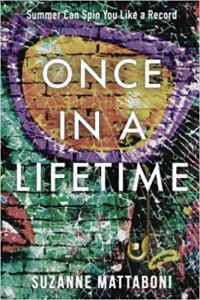Women With Attitude: How ‘80s New Wave Music Fueled Feminism
By Suzanne Mattaboni
 When I set out to write my novel Once in a Lifetime, I wanted to focus on female friendships, and on a young woman’s struggle to find her place in the world. That said, I made the decision to set the story in the 1980s. Little did I know at the time the launch of the book would coincide with Season 4 of Stranger Things, which has leveraged the charged emotional synthesizers of alternative ‘80s music like Kate Bush’s “Running Up That Hill” and captured the public’s imagination once again.
When I set out to write my novel Once in a Lifetime, I wanted to focus on female friendships, and on a young woman’s struggle to find her place in the world. That said, I made the decision to set the story in the 1980s. Little did I know at the time the launch of the book would coincide with Season 4 of Stranger Things, which has leveraged the charged emotional synthesizers of alternative ‘80s music like Kate Bush’s “Running Up That Hill” and captured the public’s imagination once again.
I wanted to bottle that brand of excitement, which was happening within the youth culture of the time, mostly connected to the New Wave music scene. It permeated everything from art and design to fashion and literature. I chose that backdrop for my protagonist Jessica, who breaks-out of a long-term relationship in order to reach for her dream of attending a pricey art program in punky London—a school she can’t afford. She’s desperate to kick-start her adult life and her creative endeavors. With three avant-garde roommates at her side, she sets out on an adventure in an artsy restaurant town, dead-set on saving enough money to fund her tuition. In the meantime, she falls for a hot daredevil guitarist… with the potential to become one more obstacle toward her goals.
I had to recreate the zeitgeist of a generation caught up in a musical revolution. In the late seventies, blasé AM radio hits were being pushed aside by a more raw, energetic, synthesized sound, as the underground brashness of the punk movement grew. “Post-punk” bands like Blondie, The Talking Heads, The Police, The Pretenders, and The B-52s brought this music out of dark and gritty alternative clubs in London and New York. Mainstream music became rife with instruments that could not just be played, but were programmed, allowing for elevated creativity. Artists like The Cars, Joe Jackson, Roxy Music, The Talking Heads, Bow Wow Wow, and Gary Numan took full advantage.
As these “New Romantic” floodgates opened, many young people made a choice to wear the aesthetic like a second skin. Post-punk was a lifestyle that dictated your clothing, your friends, what clubs you went to, how you danced—just about everything. You knew your people by what cassette tape they had in their Walkman.
Out of this revolution came a generation of women who were finally told they could have it all, without compromise. Females in the “Me Generation” could pursue love, sex, education, career fulfillment, meaningful friendships, travel, independence—you name it, they could suddenly chase it with an abandon their mothers were never afforded. They were spurred on by icons like Debbie Harry, Chrissie Hynde, Joan Jett, Cyndi Lauper, Siouxsie Sioux, and Pat Benatar, who not only stood in front of bands full of guys, but wrote their own songs and stole their own headlines. Joan and Chrissie qualified as guitar goddesses in their own right, “axe-slingers” filling their albums with raucous guitar riffs.
The ‘80s also saw all-girl stage bands rise to a success that was unprecedented, and has never quite achieved the same prominence since. Between the wildly popular Go-Gos, The Runaways, The Bangles, and even The Donnas, there wasn’t a Y chromosome to be found among them.
Women of the ‘80s were inspired by these gutsy new voices, venturing into relationships and careers with new verve. Fueled by lyrics like Romeo Void’s “I might like you better if we slept together,” Blondie’s “One way or another, I’m gonna gitcha, gitcha, gitcha, gitcha,” and The Pretenders’ “Not me, baby, I’m too precious—@^%$ off!” the girls of this movement became women with attitude.
This was as much a curse as it was a blessing. In embodying that aggressive careerist or headstrong feminist, their male counterparts were often bewildered—if not completely threatened—by this emerging independence. And consider, less-complicated girlfriend material was still easy enough for men to find. Colleges still had plenty of “MRS degree” hold-outs, who skirted through classes in search of an educated husband. Those girls were less intimidating than the newly-independent, punky feminists bent on ruling the world.
Even guitar goddess idols found themselves pigeon-holed in the sexist world of rock-and-roll. In an article back in the day, Hynde noted the irony of being boxed into the category of “female guitarist,” finding herself ranked against Joan Jett and headbanger Lita Ford. Her comment was something on the order of, “What do I have to do to be compared to Eric Clapton, grow a penis?”
This is reflected in Netflix’s new docu-series “PISTOL,” based on Sex Pistol guitarist Steve Jones’ autobiography. At one point, Chrissie Hynde roils at being snubbed as a replacement for ousted Sex Pistols guitarist Glen Matlock. And notice that although Hynde was featured in “PISTOL,” her own memoir, Reckless: My Life as a Pretender, has gone without a Netflix treatment.
So as much as characters like my protagonist Jessica were inspired to conquer the male-dominated world, they certainly felt the pressure that “wanting it all” brought to bear on their entire generation. It was not only a lot for women to live up to, it was a lot for most men to handle without denting their egos. And that’s a battle that’s still going on today.
#
Suzanne Mattaboni is a former Newsday reporter and a Pushcart Prize-nominated author of women’s fiction, horror, and pop culture essays. She’s also a retro podcaster and a past winner of Seventeen magazine’s Art and Fiction Contest. Her work has also appeared in The Huffington Post, Chicken Soup For The Soul, Mysterious Ways, Guideposts.com, Seventeen, Child, Parents, Motherwell, Dark Dossier, Turtle, Humpty Dumpty’s, Long Island Weddings, and LA Parent. She’s had pieces featured in anthologies including Pizza Parties and Poltergeist (horror stories set in the 1980s), Writes of Passage, The Little Demon Digest, and The Running Wild Anthology of Stories, www.suzannemattaboni.com,
Twitter @suzmattaboni
ONCE IN A LIFETIME
 Sweetbitter meets Bridget Jones in a John Hughes movie, Once in a Lifetime plays against a vibrant 1980s background of everything from slam dancers and rubber jelly shoes to social anarchy and AIDS.
Sweetbitter meets Bridget Jones in a John Hughes movie, Once in a Lifetime plays against a vibrant 1980s background of everything from slam dancers and rubber jelly shoes to social anarchy and AIDS.
“I’ve waited long enough for my life to happen. I want to be neck-deep in something that keeps me up all night. Something so cool I’ll be petrified and sick to my stomach at the mere thought of it. I want to absolutely fry in inspiration, then capture it in oils and charcoals and bits of broken glass, in a piece of art that oozes magic and fear and possibility. I want to find a city. An adventure. A song. Something. To hell with the American Dream. I want a reason to kick and scream.” ― Jessica Addentro, 1980s waitress, artist, and aspiring multimedia sensation
In 1984, punk is rampant. Andy Warhol rules. And 20-year-old art student Jessica is sick of all the excitement going on without her. Hungry for the life she’s convinced is just beyond her fingertips, she sets her sights on an avant-garde study abroad program in London she can’t afford. Meanwhile, hometown boyfriend Drew wants to see other people if he’s not exciting enough to keep her stateside.
Jess and her buddies rent a beat-up apartment, trolling new wave clubs and waitressing double shifts in New Hope, PA, a cool and artsy restaurant town on the river, to scrounge-up tuition money. Then Jess meets Whit, a steamy daredevil guitarist who crawls through her window and makes her head spin like a record. The girls deal with cheating waiters, mystics, a military drag queen buddy, a Svengali bouncer, and the specter of AIDs. Before long, Jess has to decide if the men in her life will leave her as damaged as her cracked-glass mosaic art projects—and whether they’ll stand in the way of her dream semester in post-punk London.
“Mattaboni masters the complications and daily nuances of female friendship while emphasizing the women’s dreams and opportunities in a vibrant cultural moment.”
BookLife – lightning bolt review
BUY HERE
Category: On Writing
























